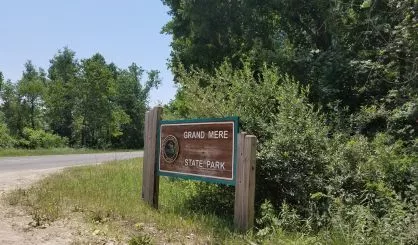Rare bi-partisan agreement in Lansing—at least in principle—may lead to overdue funding of maintenance and improvements in parks across the state. We get details from the Capitol newsroom of BridgeMichigan:
Michigan’s long-suffering parks look increasingly likely to get a big funding boost to help fill pothole-laden roads, update ancient bathrooms and revamp outdated campsites.
Republican lawmakers this week introduced three bills that, taken together, would direct $968 million of Michigan’s $5.8 billion in unspent COVID-19 stimulus dollars to state and local parks.
Two of the bills closely align with a parks funding plan Gov. Gretchen Whitmer announced earlier this year, a signal that the Democratic governor and Republican-led legislature are in general agreement about using some of Michigan’s stimulus windfall to spiff up Michigan’s popular but poorly maintained parks.
Senate Bill 703, sponsored by Ed McBroom, R-Vulcan, would allocate $250 million to drive down a $264 million maintenance backlog in Michigan’s state parks, and would devote $30 million apiece to the Mackinac State Historic Parks and a new “Northern Michigan tourism and sports fund.”
Senate Bill 704, sponsored by Michael MacDonald, R-Macomb, would devote $150 million for grants to help local parks systems make their own facilities upgrades.
A third bill, sponsored by Sen. John Bumstead, R-Newaygo, would use $508 million to fill the State Park Endowment Fund up to its $800 million cap. That would create new long-term funding for the parks system, which relies upon disbursements from the endowment to buy new land and cover expenses at the land it already owns.
But it’s unclear whether padding a trust fund is an allowable use of federal COVID stimulus dollars, which states are required to spend by the end of 2026.
Clay Summers, executive director of the Michigan Recreation and Park Association, which represents public parks systems throughout the state, said his organization is seeking more clarity before deciding whether to support the third bill.
Using COVID dollars to create permanent parks funding “certainly makes all the sense in the world from a practical standpoint,” Summers said, “… but we’re not sure of the legality at this point.”
If the endowment fund proposal passes legal muster, McBroom estimated that it could boost the parks system’s annual funding by tens of million dollars.
“It’s going to allow us to not suffer this backlog on infrastructure in the future,” he said.
Spokespeople with Whitmer’s office said they “look forward” to working with the legislature to get money out the door.
“One of our state’s greatest strengths is our pristine natural resources,” Whitmer spokesperson Bobby Leddy said in an email to Bridge Michigan. “That’s why Governor Whitmer and the legislature have put forward very similar proposals to make historic investments in our state and local parks.”
The spending proposals build upon recommendations from a 2012 Michigan State Parks and Outdoor Recreation Blue Ribbon Panel convened under Republican Gov. Rick Snyder.
The proposed funding would represent a major windfall for the state parks system, whose annual operating budget this year is just $80 million, along with $20 million for capital improvement projects.
Taken together, state parks chief Ron Olson said, the funding boosts would be “tremendous” for a system that, while beloved, has long struggled to maintain its assets.
Following decades of worsening conditions at Michigan’s 103 state parks, the state in 2010 created an $11 annual recreation passport visitors can buy to gain year-round access to state parks. That infused the system with new operating cash, helping the system’s budget to grow from about $48 million in fiscal year 2011 to $80 million this year.
But the added passport revenue has not been enough to make a dent in the maintenance backlog that had ballooned over decades, leaving crumbling roads, outdated facilities and unmaintained trails.
Money to address those issues would come at a crucial moment: Michigan’s parks have never been more popular. At state parks alone, visitation is up 30 percent since the pandemic began.
“It’s a legacy-builder,” Olson said of the possible funding boost. “This is a way to create that up-to-date atmosphere so people can enjoy themselves in a clean, safe park.”
The bills have been referred to the Senate Appropriations Committee, where they await a hearing.






